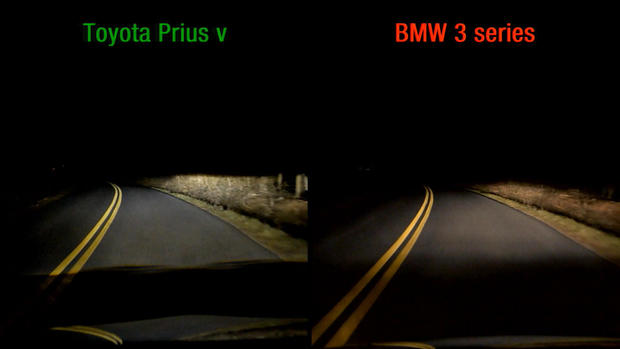Report shines light on big performance gap for car headlights
The Insurance Institute for Highway Safety is shining a light on poorly performing headlights. For the first time, its researchers tested the illumination from more than 30 mid-size sedans, and just one vehicle earned the top rating.
The report finds that all headlights are not created equal. In fact, there's a lot of variation and just because the car may cost more, doesn't mean its headlights perform the best, reports CBS News correspondent Kris Van Cleave.
A side-by-side video shows the difference between the top performing Toyota Prius v with its optioned LED headlights and the BMW 3 Series with halogen head lights.
At 50 feet, the driver of the Prius can clearly see a person in blue jeans and a deer on the road, but the 3 Series driver does not make them out clearly.
Still, the pricey BMW was among the nine cars that managed a marginal rating, which still beat 10 2016 mid-size cars tested. They were all rated poor by the Insurance Institute for Highway Safety.
"The big thing that we found is that there is a large variation in the amount of light down the road. For instance, worst performing headlight, low beam only projects 130 feet down the road. In contrast, the best performing vehicle, Toyota Prius v with LED headlights, projects 400 feet down the road," said David Zuby of the Insurance Institute for Highway Safety. "There are government regulations dictating how much light comes out of the bulb, but not necessarily where it goes and whether or not it is usable by the driver."
Motor trend editor Jason Cammisa called the current headlight regulations "dim witted."
"I'd say that our standards are poor, and they're based on old technology and haven't adapted to what's available," Cammisa said. "The NHTSA needs to look at the true safety benefits of being able to see at night."
One recent study found nearly half of the accidents happen at night, even though traffic is 25 percent lower, and according to the National Safety Council, the number of traffic fatalities is three times higher at night than during the day. A factor in all of that is the reduced visibility.
"Most of us take lights for granted," said former NTSA Chair Deborah Hersman. "When cars are designed to minimum standards but not held to a higher standard, you're going to see a lot of people fall in that pack."
The NHTSA told CBS News: "NHTSA is committed to promoting a higher standard of safety, including in headlighting systems. That's why our planned revamp of the 5-Star Safety Ratings published in December included incentivizing better headlamp performance. Both Secretary Foxx and Administrator Rosekind have spoken out about the need to identify and remove potential regulatory hurdles to safety improvements. To that end, the agency has conducted research on adaptive headlighting and is moving to take actions to permit this innovative safety technology."
In a statement to CBS News, BMW also said: "The BMW Group has been an industry leader for headlight technology innovation for more than four decades. BMW was the first to introduce ellipsoid projector headlights, electronic adaptive headlight technology, xenon headlights and most recently BMW Laserlights. BMW has also pioneered Night Vision systems that can detect animals and pedestrians far beyond the range of the best headlight systems. While we are disappointed with the results of the IIHS headlight test of a BMW 3 Series equipped with basic halogen headlights, we remain confident that we offer our customers very effective headlight systems at a variety of price points."
